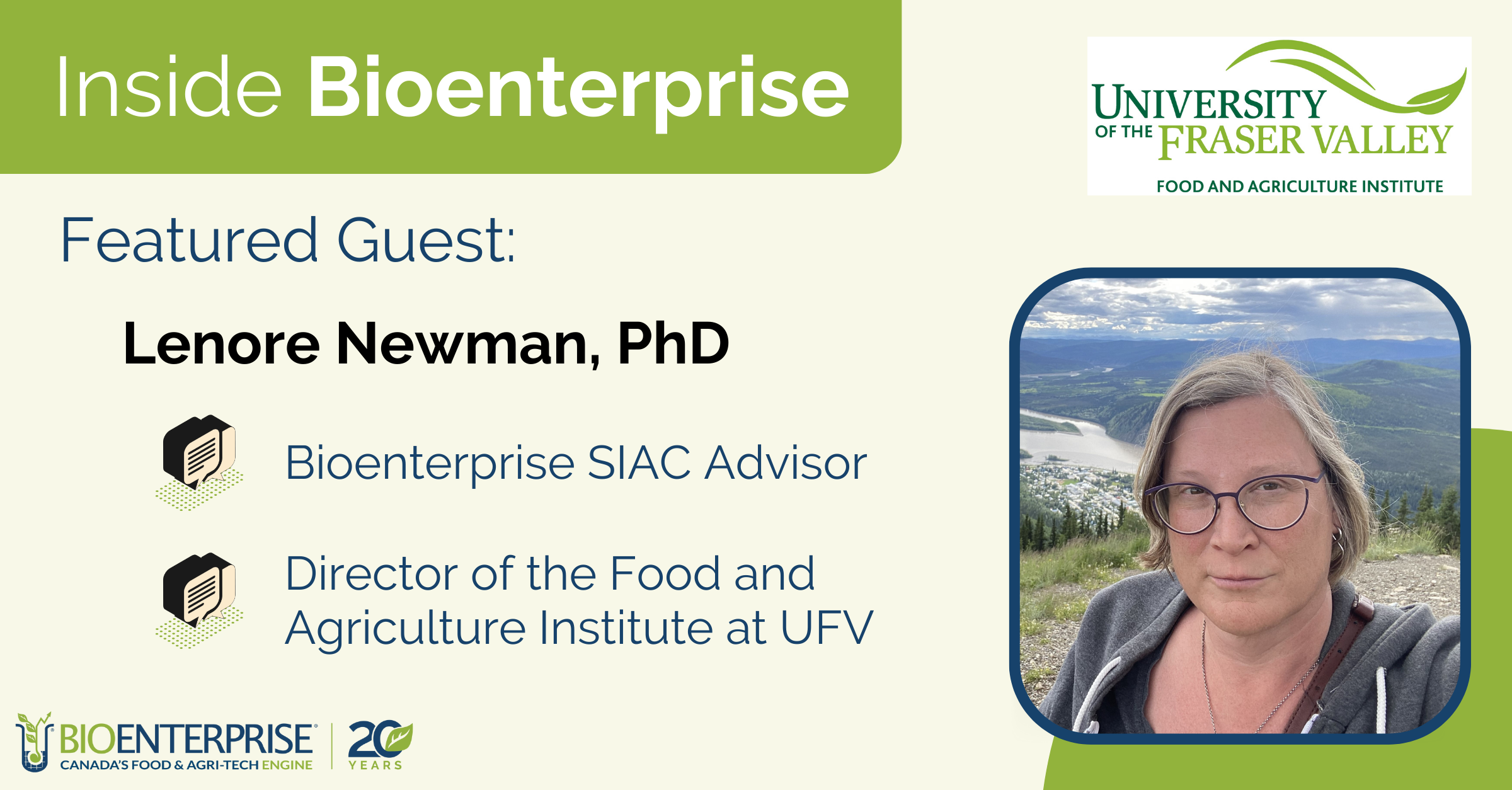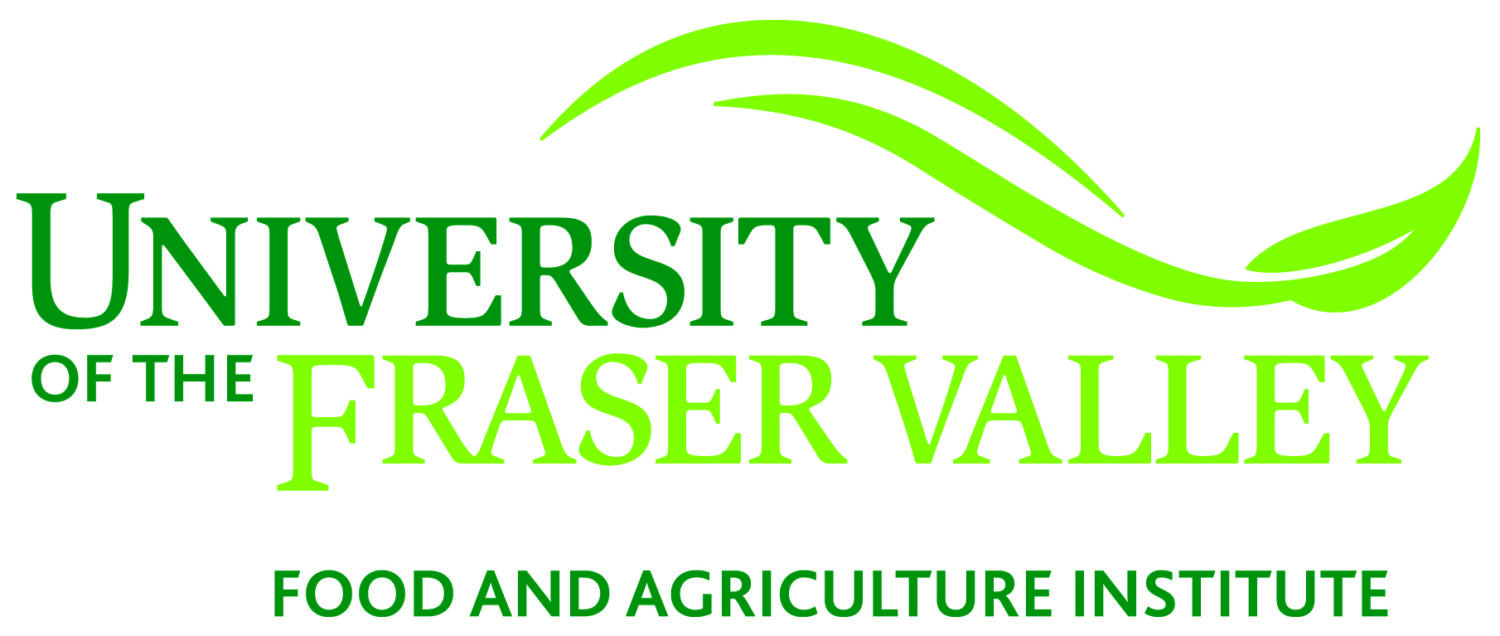
Lenore Newman, Director of the Food and Agriculture Institute at UFV, Bioenterprise SIAC Advisor, and culinary geographer dishes on the intersection of science, culture, and food – from fermentation and cellular ag to diversity and inclusion across the sector
By Tabitha Caswell for Bioenterprise
Past, present, future and from all corners of the globe, few leaders in agriculture perceive the world as Lenore Newman does. From the briny open air on the shores of Sechelt, British Columbia to the echo in the halls of prestigious Canadian universities, her story is one of exploration and discovery, centered around a deep and personal connection to food.
An entrepreneur, an academic, an author, and an advocate, Lenore casts a wide net. Here, she shares bits of wisdom from her broad collection of treasures – where the lines separating culinary and cultural delights, scientific wonders, and healthy capitalism blur.
Riding the Wave
Raised amidst the rhythmic ebb and flow of western Canadian tides, Lenore Newman’s early days were spent thinking of the daily catch. The family’s fishing business formed her initial understanding of the relationship between food and industry. But beyond the horizon of the Pacific, a bigger world beckoned with the promise of satisfying a hungry mind, leading her far from home.
After a deep dive into Applied Physics at the University of British Columbia (UBC), Lenore’s wanderlust drove her out to travel and explore the planet, both geographically and socially, revealing a desire to know more.
She honed her expertise earning a master’s degree in environmental studies and a doctorate in complex adaptive systems theory at York University. During her postdoc, Lenore learned to navigate the labyrinth of government and policy, mastering the art of marrying theory with practicality.
Beyond academia, Lenore’s pen has chronicled her insights on the future of farming and food issues. As an author of three books and numerous scholarly articles, her writings reflect a harmonious blend of her seaside beginnings, research and scholarly pursuits, and adventures across the globe.
Today, as a key member of the Science and Innovation Advisory Committee (SIAC) with Bioenterprise and the director of the Food and Agriculture Institute at the University of the Fraser Valley (UFV), Lenore is poised to tackle food security issues from all angles.
Deconstructing Food Security
At UFV Lenore leads from the interface of industry, government, and academia. While technically a professor, she describes her role: less teaching and more project management, running her lab like a think tank to develop a new way of looking at things. She says, “Industry brings me problems; I get my team on them, and we solve them.”
Working outside the traditional academic structure with the ability to initiate real change at the policy level has proven to be highly effective for her team at the lab. Throughout her career, Lenore has witnessed smooth functioning food systems in other countries and aims to bring this perspective to our system here. “I really do believe in what the Dutch call the triple helix of academy, government, and industry. These three entities should talk to each other and work together.”
While Canadian agriculture undoubtedly has challenges to overcome, Newman is quick to defend criticism, saying it has demonstrated resilience and efficiency, especially during challenging times like the pandemic.
However, like the Dutch, she says the government should ensure that the food offered meets essential criteria, grounded in science. Moreover, transparency is crucial. If companies feel the need to hide their practices through legislation, they’re likely not adhering to ethical standards. As she puts it, people shouldn’t need advanced degrees to make informed food choices.
Lenore says, “Food security is about providing food that is healthy, environmentally just, available, costs the right amount, and also hits cultural needs.” She explains that at its core, food security should be a simple assurance for consumers, who already struggle to juggle their daily responsibilities. However, society often shifts blame to the individual, expecting them to meticulously analyze labels rather than holding governments accountable.
Canada is a young country compared to others around the world, and in its infancy, we have more to learn. Our hectic pace of life in North America has influenced our perception of what food should be and it has affected our relationship with it. Here, the food system will evolve alongside our developing culture.
Exploring the Complexity of Cuisine
At the crossroads of food and culture lies the fascinating realm of “culinary geography,” where Lenore falls naturally into alignment. She understands and navigates the confluence of biology, logistics, cultural nuances, and optimization. “The food system is really complex,” she explains. “It is deeply attached to land, but also deeply attached to global trade, and to all these human systems that make it work.”
Beyond the theoretical, Lenore’s work delves directly into the movement of food. She retraces its steps and follows its footprints, engaging with chefs and analyzing culinary trends, even penning a book called Lost Feast: Culinary Extinction and the Future of Food, among others. In this way, her work has come full circle, celebrating an enduring passion for the entire food system.
A recent sojourn led her to the Arctic, where she studied plant varietals on the tundra and their responses to climate change. Fascinated by challenges faced in the Arctic and various other geographic regions like northern Canada, Lenore advocates for localized solutions to address food security in environments with unique conditions. How will we find these solutions? Through innovative technology.
Embracing the Renaissance
Lenore Newman firmly believes that we are currently witnessing the “renaissance of food tech.” This is a period, characterized by a cultural awakening – a rebirth in thinking about the way we produce food. As we gain momentum in this field, rapid acceleration will bring both advancement and challenge.
Lenore’s optimism about technological progress is unwavering; in her eyes, no challenge is insurmountable. However, she expresses concern over certain misconceptions and fears, like those surrounding genetic engineering, particularly here in North America. These fears, she believes, are hindering crucial advancements that could alleviate some of the more pressing issues in the food industry.
Newman cites the harrowing practice of disposing of male baby chickens as an example. Through genetic engineering, we could easily and selectively produce only female chicks, eliminating the brutality of this inhumane act. However, the widespread aversion to genetically modified organisms (GMOs) stands as a barrier to such progress.
Especially given the threats posed by climate change and the ever-mounting pressures on conventional crops, genetic engineering – aided by tools like CRISPR – might be our best bet. Acknowledging the need for a shift in perception, the primary goal is clear: we must find efficient and sustainable ways to feed a growing global population. The good news? Some of these innovations are already at our fingertips.
Pioneering Ag for a Modern Era
Vertical agriculture, despite its current struggles, is poised to revolutionize the way we source our greens. Newman identifies the promise of this technology, observing how Japan has adeptly integrated it to counter seasonal constraints. While many dismiss the concept as another fleeting trend, the inefficiencies of long-standing agricultural practices are becoming evident.
With the environmental toll of traditional methods becoming harder to ignore, Lenore predicts a future where importing lettuce from places like California will become obsolete. Furthermore, she believes the true game-changer of the future lies in the domains of cellular agriculture and precision fermentation.
The surging demand for protein has outpaced conventional supply methods, necessitating innovative alternatives. “The food system needs diversification in its protein portfolio, beyond just animal protein,” Newman states.
Although plant-based proteins have carved their niche, they face criticisms related to ultra-processing and culinary equivalence. Herein lies the domain of precision fermentation, a technique primed to transform the dairy industry. Newman adds, “Now we’ll have cellular dairy coming in, being made in a vat just like you make beer. And that is going to be a dominant industry. I think Canada can own it because we grow the feedstock. Also, we know how to meet the kind of scale that’s required.”
Looking forward, Newman’s optimism about technology’s potential is palpable. Undeterred by current technological challenges, she believes in humanity’s relentless drive to innovate, encapsulating her faith with, “Technology always wins! We’ve never encountered or imagined a technological barrier we didn’t break through eventually.”
Drawing parallels between distillation and the production of cellular dairy, she alludes to a future where meat might also be “brewed.” For some, this idea may seem far-fetched, but this isn’t science fiction, folks. It is, in all likelihood, reality. To feed the world, we must broaden our current scope and imagination.
Establishing a New Frontier
In North America, the perception of agriculture often seems trapped in a bygone era. Popular culture paints a picture of farms that are reminiscent of the 1930s. Although charming at times, this image is not only inaccurate but also hinders potential growth in the sector. This “Old MacDonald Syndrome” creates misconceptions about the nature of modern farming.
The reality is that farming has always been evolving, and today’s agriculture is a highly technical and innovative field. Farmers are not just tending to livestock and tilling fields; they’re deploying drones, using autonomous tractors, and harnessing the power of data to optimize their yields.
Unfortunately, the outdated portrayal results in a lack of interest and awareness about the numerous opportunities within the sector. Newman aptly captures the evolving nature of the field, stating, “I do think agriculture is an opportunity – it’s just going to look different than we thought, and we might have farmers that aren’t out in the dirt; they probably will be in a lab somewhere. And you know what? That’s cool because things change!”
In the future, will we be dining on dishes synthesized from subatomic particles by devices like the replicator on the Starship Enterprise? Only if we move beyond the past. And if we can jump the fear hurdle, the question will become: what do we want that future to look like? For Canadians, our immediate next step should be to claim our position as innovative leaders in the global market.
Becoming an Agri-Tech Powerhouse
The Netherlands, despite its less-than-ideal agricultural conditions, has emerged as an agrarian titan. How? The Dutch Hunger Winter of 1944-45 left a scar on the nation. Post-World War II, the government prioritized its mission of never subjecting their people to hunger again. Starvation, the kind that kills 20,000 citizens, is a motivating factor like no other – enough to catalyze action and real change.
With specific ‘top sectors’ identified, the Netherlands became a dominant force in areas like horticulture. But their success isn’t just about producing food, it’s about pioneering and selling technology. Lenore is right: a greenhouse anywhere in the world is likely equipped with Dutch innovations.
Canada, a country abundantly gifted with resources, hasn’t quite reached its full potential yet. And it seems rather obvious where we should be focusing our efforts. Newman remarks, “We should be leading the world in growing lettuce inside because we can’t grow it outside. So, we should be selling this tech to the rest of the world.”
Given Canada’s climate, this makes logical sense. She adds that we should also be leading in precision fermentation. “It should be a slam dunk!” So, why aren’t we there yet? Lenore believes the challenge Canada faces isn’t just about production but innovation, leveraging technology, and establishing a dedicated agricultural research stream – a foundation currently missing in its universities and funding systems.
“We’re the only G8 country without a dedicated research funding stream in agriculture,” Lenore says. She goes on to explain that it isn’t just lack of funding standing in the way of progress. We also need to attract students interested in high tech, and this is a cultural issue. There is an untapped pool of candidates, either unaware of opportunity or being held back, who may unknowingly harbour the next great innovation within their brains. To unlock those ideas, we need to tease out the talent.
Cultivating Diversity
The landscape of agriculture is witnessing gradual, yet noticeable change, with increasing representation from women and minorities, particularly in STEM-related agricultural roles. Lenore points out that while this shift is promising, there are areas that require further attention.
From her observations, she says a significant portion of venture capital within the sector still predominantly flows to a “specific demographic.” Similarly, representation on many government-appointed boards seems to lean toward that narrower demographic.
Pointing to herself as an example, she says, “It’s funny, as a queer woman, I often think I probably wouldn’t do the job I do today if I hadn’t grown up on a halibut boat.” She explains that being born into that environment may have given her an edge, and had she not been given that advantage, she may have suffered more of the systemic bias she witnesses in the sector.
For this reason, Newman serves as an advocate for change, and underscores the importance of diversity, noting that while every individual’s contribution is valuable, reflecting the varied face of the upcoming workforce is crucial for a balanced and inclusive future in agriculture.
In Lenore’s lab, she encourages students to step outside their comfort zone to experience new environments. “I send them into spaces they usually wouldn’t be in.” This cultivates cross-collaboration, breaks down barriers, and fosters growth for everyone.
Partnering with Purpose
Lenore’s affiliation with Bioenterprise perfectly complements her concurrent interests in academia and business. Her no-nonsense manner and entrepreneurial spirit thrive through mentoring and association with start-ups. Is collaboration important? “Yes,” Lenore believes, “but it’s more important to have solid goals.”
For Newman, the true value in partnership lies in a focused approach that is purpose-driven with meaningful outcomes. Ideally, she seeks not only to throw knowledge at entrepreneurs but to have a tangible stake in the projects and people she engages with – people who share her enthusiasm for food technology and her dedication to producing results.
So, what’s next for Lenore? While it’s tempting to retreat to the family farm, swing in the hammock and write more fun books about food, the thought of climate change bearing down on us weighs heavily on her. Driven to explore further, she charts a course for the new frontier, where food is safe, sustainable, and accessible for everyone.
With her eclectic collection of practical and life experiences, Lenore Newman guides the next generation forward in agriculture to find solutions – rooted in science and supported by technology – with a singular, profound purpose: to ensure our plates are full on tomorrow’s table.
-30-
Media Contacts:
Tabitha Caswell, Content Writer, Bioenterprise Canada
tabitha.caswell@bioenterprise.ca
Jordan Sidsworth, Marketing Specialist, Bioenterprise Canada
About Bioenterprise Canada
Bioenterprise is Canada’s Food & Agri-Tech Engine, a national agri-technology focused commercialization accelerator. Bioenterprise uses its 20 years of industry experience and a global network of experts, mentors, funders, researchers, and industry partners to help small and medium-sized agri-food businesses connect, innovate and grow.
About University of the Fraser Valley
Located in the beautiful Fraser Valley just east of Vancouver, British Columbia, Canada, the University of the Fraser Valley (UFV) is a fully accredited, public university that enrolls approximately 15,000 students per year. UFV has campuses and locations in Abbotsford, Chilliwack, Mission, and Hope, and a growing presence in Chandigarh, India.

